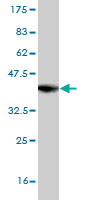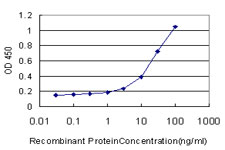SLC44A1 Antibody (monoclonal) (M02)
Mouse monoclonal antibody raised against a partial recombinant SLC44A1.
- SPECIFICATION
- CITATIONS: 1
- PROTOCOLS
- BACKGROUND

Application
| WB, E |
|---|---|
| Primary Accession | Q8WWI5 |
| Other Accession | NM_080546 |
| Reactivity | Human |
| Host | mouse |
| Clonality | Monoclonal |
| Isotype | IgG2a Kappa |
| Clone Names | 1C4 |
| Calculated MW | 73302 Da |
| Gene ID | 23446 |
|---|---|
| Other Names | Choline transporter-like protein 1, CDw92, Solute carrier family 44 member 1, CD92, SLC44A1, CD92, CDW92, CTL1 |
| Target/Specificity | SLC44A1 (NP_536856, 74 a.a. ~ 183 a.a) partial recombinant protein with GST tag. MW of the GST tag alone is 26 KDa. |
| Dilution | WB~~1:500~1000 E~~N/A |
| Format | Clear, colorless solution in phosphate buffered saline, pH 7.2 . |
| Storage | Store at -20°C or lower. Aliquot to avoid repeated freezing and thawing. |
| Precautions | SLC44A1 Antibody (monoclonal) (M02) is for research use only and not for use in diagnostic or therapeutic procedures. |

Provided below are standard protocols that you may find useful for product applications.
References
Detection of choline transporter-like 1 protein CTL1 in neuroblastoma x glioma cells and in the CNS, and its role in choline uptake. Machov? E, et al. J Neurochem, 2009 Aug. PMID 19519661.Meta-analysis of genome-wide association data identifies two loci influencing age at menarche. Perry JR, et al. Nat Genet, 2009 Jun. PMID 19448620.The solute carrier 44A1 is a mitochondrial protein and mediates choline transport. Michel V, et al. FASEB J, 2009 Aug. PMID 19357133.Genomic organization, promoter activity, and expression of the human choline transporter-like protein 1. Yuan Z, et al. Physiol Genomics, 2006 Jun 16. PMID 16609143.Impaired trafficking of choline transporter-like protein-1 at plasma membrane and inhibition of choline transport in THP-1 monocyte-derived macrophages. Fullerton MD, et al. Am J Physiol Cell Physiol, 2006 Apr. PMID 16319125.
If you have used an Abcepta product and would like to share how it has performed, please click on the "Submit Review" button and provide the requested information. Our staff will examine and post your review and contact you if needed.
If you have any additional inquiries please email technical services at tech@abcepta.com.














 Foundational characteristics of cancer include proliferation, angiogenesis, migration, evasion of apoptosis, and cellular immortality. Find key markers for these cellular processes and antibodies to detect them.
Foundational characteristics of cancer include proliferation, angiogenesis, migration, evasion of apoptosis, and cellular immortality. Find key markers for these cellular processes and antibodies to detect them. The SUMOplot™ Analysis Program predicts and scores sumoylation sites in your protein. SUMOylation is a post-translational modification involved in various cellular processes, such as nuclear-cytosolic transport, transcriptional regulation, apoptosis, protein stability, response to stress, and progression through the cell cycle.
The SUMOplot™ Analysis Program predicts and scores sumoylation sites in your protein. SUMOylation is a post-translational modification involved in various cellular processes, such as nuclear-cytosolic transport, transcriptional regulation, apoptosis, protein stability, response to stress, and progression through the cell cycle. The Autophagy Receptor Motif Plotter predicts and scores autophagy receptor binding sites in your protein. Identifying proteins connected to this pathway is critical to understanding the role of autophagy in physiological as well as pathological processes such as development, differentiation, neurodegenerative diseases, stress, infection, and cancer.
The Autophagy Receptor Motif Plotter predicts and scores autophagy receptor binding sites in your protein. Identifying proteins connected to this pathway is critical to understanding the role of autophagy in physiological as well as pathological processes such as development, differentiation, neurodegenerative diseases, stress, infection, and cancer.


